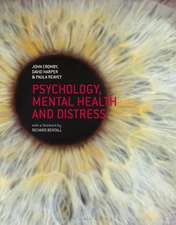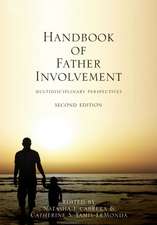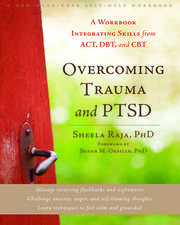Schizophrenia: Innovations in Diagnosis and Treatment
Autor Colin Rossen Limba Engleză Paperback – 5 noi 2004
In Schizophrenia: Innovations in Diagnosis and Treatment, Dr. Colin A. Ross—founder of the Colin A. Ross Institute for Psychological Trauma—presents a new theory of the existence of a dissociative subtype of schizophrenia. Dr. Ross determines that some patients diagnosed with schizophrenia have symptoms closely related to dissociative identity disorder—or multiple personality disorder—and have a history of psychological trauma. In these cases, this unprecedented book proposes that the disorder is treatable—perhaps even curable—using psychotherapy rather than drugs.
Schizophrenia: Innovations in Diagnosis and Treatment will revolutionize the profession of psychology with data, arguments, and a review of previously published literature to support Dr. Ross’s theory. Traditionally, schizophrenia is considered manageable only by a lifetime of psychotropic drugs—expensive, harmful, and often ineffectual. This book offers an alternative free of damaging chemicals to improve quality of life for patients with schizophrenia whose symptoms may be trauma-based.
Schizophrenia: Innovations in Diagnosis and Treatment offers specific, detailed ideas and research on:
- genetic studies showing that while there is a genetic connection, it is not prevalent enough for biology to be the only predisposing factor in all cases of schizophrenia
- a comparison of the definitions of psychosis, schizophrenia, and dissociation—from the DSM-IV-TR and other texts—to determine relationships between the three disorders
- proposed diagnostic criteria for dissociative schizophrenia—dissociative amnesia, depersonalization, the presence of two or more distinct personalities/identities, auditory hallucinations, extensive comorbidity, and severe childhood trauma
- the principles of psychotherapy for dissociative schizophrenia—when to start therapy, trauma therapy, how to establish communication with the patient, and therapeutic neutrality
- and more!
| Toate formatele și edițiile | Preț | Express |
|---|---|---|
| Paperback (1) | 313.92 lei 6-8 săpt. | |
| Taylor & Francis – 5 noi 2004 | 313.92 lei 6-8 săpt. | |
| Hardback (1) | 1095.70 lei 6-8 săpt. | |
| Taylor & Francis – 11 noi 2004 | 1095.70 lei 6-8 săpt. |
Preț: 313.92 lei
Preț vechi: 424.67 lei
-26% Nou
Puncte Express: 471
Preț estimativ în valută:
60.08€ • 62.49$ • 49.60£
60.08€ • 62.49$ • 49.60£
Carte tipărită la comandă
Livrare economică 12-26 aprilie
Preluare comenzi: 021 569.72.76
Specificații
ISBN-13: 9780789022707
ISBN-10: 0789022702
Pagini: 306
Dimensiuni: 152 x 229 x 20 mm
Greutate: 0.39 kg
Ediția:1
Editura: Taylor & Francis
Colecția Routledge
Locul publicării:Oxford, United Kingdom
ISBN-10: 0789022702
Pagini: 306
Dimensiuni: 152 x 229 x 20 mm
Greutate: 0.39 kg
Ediția:1
Editura: Taylor & Francis
Colecția Routledge
Locul publicării:Oxford, United Kingdom
Cuprins
- Preface
- Acknowledgments
- A Statement of the Problem
- PART I: A DISSOCIATIVE SUBTYPE OF SCHIZOPHRENIA
- Chapter 1. Assumptions and Logic Underlying the Dissociative Subtype of Schizophrenia
- A Model of Gene-Environment Interaction
- Implications of Monozygotic Twin Data
- The Triangle of Recovery
- Chapter 2. Characteristics of the Dissociative Subtype of Schizophrenia
- The Spectrum from Nondissociative Subtypes of Schizophrenia to Dissociative Identity Disorder
- PART II: PSYCHOSIS AND SCHIZOPHRENIA
- Chapter 3. Definitions of Psychosis and Schizophrenia
- DSM-IV-TR Definitions of Psychosis
- DSM-IV-TR Text and Criteria for Schizophrenia
- Chapter 4. The Genetic Model of Schizophrenia
- The Genome As a Minor Contributor to the Causes of Schizophrenia
- Evidence for the Toxic and Protective Effects of the Psychosocial Environment
- Chapter 5. The Efficacy of Antipsychotic Medication
- Chapter 6. Psychosis and Trauma (John Reed and Colin A. Ross)
- Childhood Trauma and General Psychopathology
- The Base Rate of Child Abuse Among Psychiatric Inpatients
- Childhood Trauma and Psychosis
- Failure of Most Research on Schizophrenia to Consider Psychological Trauma
- PART III: DISSOCIATION AND DISSOCIATIVE IDENTITY DISORDER
- Chapter 7. Definition and Scientific Status of Dissociation
- Errors of Logic and Scholarship Concerning Dissociation
- Diagnosis of Dissociative Identity Disorder
- General Errors of Logic and Scholarship
- Chapter 8. Dissociation and Trauma
- A Continuum of Dissociation Versus Discrete Pathological States
- The Trauma-Dissociation Model
- Chapter 9. Dissociative Identity Disorder
- Reliability and Validity
- Etiology
- Epidemiology
- Phenomenology
- PART IV: DISSOCIATIVE IDENTITY DISORDER AND SCHIZOPHRENIA
- Chapter 10. Bleuler’s Description of Schizophrenia
- Analysis of Bleuler’s 1991 Text on Schizophrenia
- The Fundamental Role of Dissociation in Schizophrenia
- Chapter 11. Positive Symptoms in Schizophrenia and Dissociative Identity Disorder
- Distinction Between Schizophrenia and DID in the Schizophrenia Literature
- Data on the Overlap Between Schizophrenia and DID
- A Prospective Study of the Dissociative Subtype of Schizophrenia
- Chapter 12. Case Examples of Dissociative Schizophrenia
- From August Hoch, MD
- From Sheila Cantor, MD
- From Patricia J. Ruocchio
- From Barbara A. Turner
- From Janice C. Jordan
- From Leslie Greenblat
- Chapter 13. Hysterical and Reactive Psychoses
- Chapter 14. Proposed Diagnostic Criteria for Dissociative Schizophrenia
- 295.40 Dissociative Type
- Diagnostic Criteria for 295.40 Dissociative Type
- PART V: TREATMENT
- Chapter 15. Treatment Outcome Data
- Subjects and Treatment Provided
- Methodological Limitations of the Study
- Limitations of the Literature
- Treatment Outcomes
- Chapter 16. Principles of Psychotherapy for Dissociative Schizophrenia
- Principles of Trauma Therapy
- Chapter 17. Talking to the Voices
- Bibliography
- Index
- Reference Notes Included
Descriere
In Schizophrenia: Innovations in Diagnosis and Treatment, Dr. Colin A. Ross—founder of the Colin A. Ross Institute for Psychological Trauma—presents a new theory of the existence of a dissociative subtype of schizophrenia related to psychological trauma that can be treated with psychotherapy as opposed to medications. This book explores his concept, which is supported by an extensive bibliography, case studies, and numerous tables. This one-of-a-kind volume is a must-read for psychiatrists, psychologists, and other professionals involved in research and/or treatment of schizophrenia. Its comprehensible text makes it useful for patients with schizophrenia and their family members as well.
To view an excerpt online, find the book in our QuickSearch catalog at www.HaworthPress.com.
To view an excerpt online, find the book in our QuickSearch catalog at www.HaworthPress.com.























